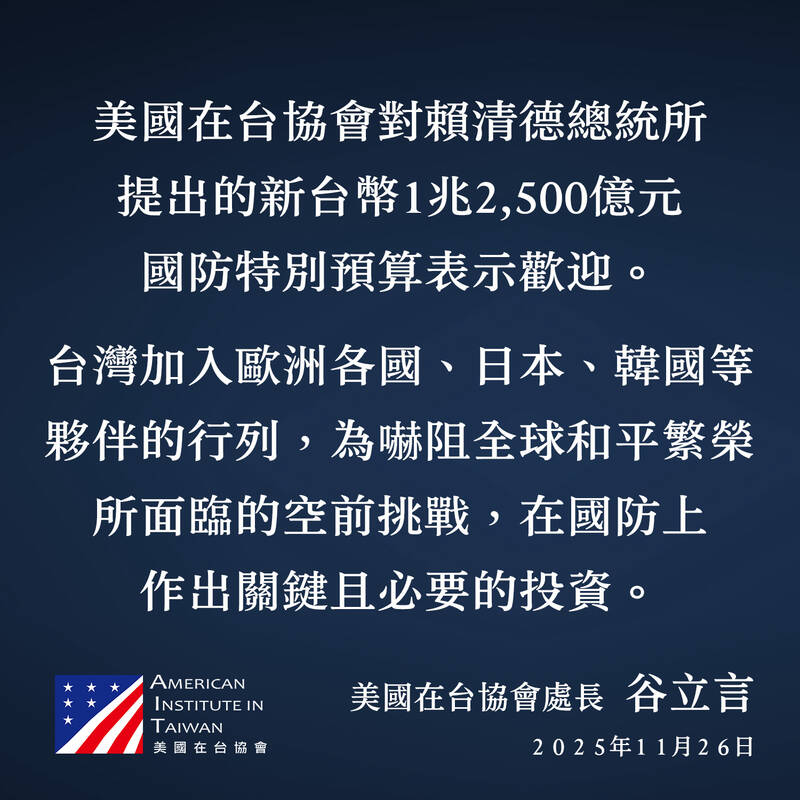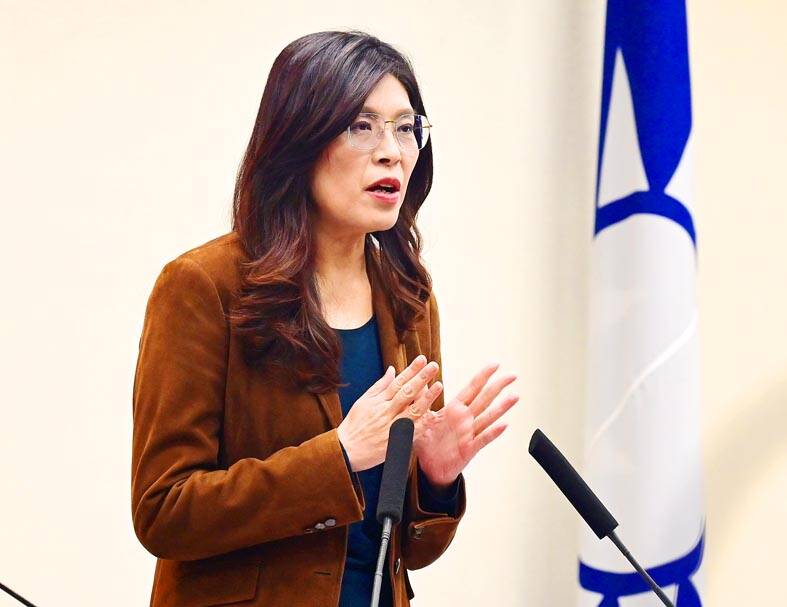The top US envoy to Taiwan yesterday said that President William Lai’s (賴清德) proposed US$40 billion special defense budget marks “a major step toward maintaining peace and stability across the Taiwan Strait by strengthening deterrence.”
Lai first outlined the budget proposal in the Washington Post, hours before reiterating the plan at a news conference in Taipei.
American Institute in Taiwan Director Raymond Greene on social media said that Taiwan is joining “partners from across Europe to Japan and [South] Korea that are making critical defense investments necessary to deter unprecedented challenges to global peace and prosperity.”

Photo grab from AIT FB
He reiterated Washington’s stance in supporting Taiwan’s “rapid acquisition of critical asymmetric capabilities needed to strengthen deterrence” under the Taiwan Relations Act and “decades of commitment across multiple US administrations.”
Addressing the opposition parties, Greene said: “Just as support for Taiwan is a longstanding US bipartisan priority, I expect Taiwan’s political parties will find similar common ground.”
“Whether your priority is preserving Taiwan’s democracy and market economy, fostering conditions for cross-strait dialogue or maintaining support from the international community, increasing Taiwan’s defense capabilities is a necessary precondition,” he said. “The entire world has a stake in ensuring that differences across the Taiwan Strait are resolved peacefully and free from coercion.”

Photo: Wang Yi-song, Taipei Times
Democratic Progressive Party (DPP) caucus chief executive Chung Chia-pin (鍾佳濱) said that Lai’s commitment to increasing defense spending is consistent with the policies of other democracies.
Nations that experience increasing economic and social prosperity necessarily invest in bolstering their defense and national security, he said.
DPP Legislator Puma Shen (沈伯洋) said that Lai’s editorial was an important signal to Washington, which has been vocal in demanding Taiwan show its resolve to defend itself by increasing military and civil defense spending.
Chinese Nationalist Party (KMT) Chairwoman Cheng Li-wun (鄭麗文) told a news conference that Lai was “playing with fire” by pledging to increase Taiwan’s defense budget, echoing a phrase Beijing frequently uses to criticize foreign policies it deems to be provocative to China.
Lai’s comments are “an investment in war” that would transform the Taiwan Strait into a powder keg and Taiwan into an arms factory, Cheng said after urging the president to refrain from becoming a “troublemaker.”
Taiwan People’s Party (TPP) Chairman Huang Kuo-chang (黃國昌), currently visiting Japan, said in a video message that the TPP supports a “reasonable” increase in defense spending, but would conduct a “practical and rational” review to ensure taxpayers’ money is well spent.
Additional reporting by Lee Wen-hsin

Taiwan has received more than US$70 million in royalties as of the end of last year from developing the F-16V jet as countries worldwide purchase or upgrade to this popular model, government and military officials said on Saturday. Taiwan funded the development of the F-16V jet and ended up the sole investor as other countries withdrew from the program. Now the F-16V is increasingly popular and countries must pay Taiwan a percentage in royalties when they purchase new F-16V aircraft or upgrade older F-16 models. The next five years are expected to be the peak for these royalties, with Taiwan potentially earning

STAY IN YOUR LANE: As the US and Israel attack Iran, the ministry has warned China not to overstep by including Taiwanese citizens in its evacuation orders The Ministry of Foreign Affairs (MOFA) yesterday rebuked a statement by China’s embassy in Israel that it would evacuate Taiwanese holders of Chinese travel documents from Israel amid the latter’s escalating conflict with Iran. Tensions have risen across the Middle East in the wake of US and Israeli airstrikes on Iran beginning Saturday. China subsequently issued an evacuation notice for its citizens. In a news release, the Chinese embassy in Israel said holders of “Taiwan compatriot permits (台胞證)” issued to Taiwanese nationals by Chinese authorities for travel to China — could register for evacuation to Egypt. In Taipei, the ministry yesterday said Taiwan

‘LIKE-MINDED PARTNER’: Tako van Popta said it would be inappropriate to delay signing the deal with Taiwan because of China, adding he would promote the issue Canadian senators have stressed Taiwan’s importance for international trade and expressed enthusiasm for ensuring the Taiwan-Canada trade cooperation framework agreement is implemented this year. Representative to Canada Harry Tseng (曾厚仁) in an interview with the Central News Agency (CNA) said he was increasingly uneasy about Ottawa’s delays in signing the agreement, especially as Ottawa has warmed toward Beijing. There are “no negotiations left. Not only [is it] initialed, we have three versions of the text ready: English, French and Mandarin,” Tseng said. “That tells you how close we are to the final signature.” Tseng said that he hoped Canadian Prime Minister Mark Carney

POSITIVE DEVELOPMENT: Japan and the US are expected to hold in-depth discussions on Taiwan-related issues during the meeting next month, Japanese sources said The holding of a Japan-US leaders’ meeting ahead of US President Donald Trump’s visit to China is positive news for Taiwan, former Japan-Taiwan Exchange Association representative Hiroyasu Izumi said yesterday. After the Liberal Democratic Party’s landslide victory in Japan’s House of Representatives election, Japanese Prime Minister Sanae Takaichi is scheduled to visit the US next month, where she is to meet with Trump ahead of the US president’s planned visit to China from March 31 to April 2 for a meeting with Chinese President Xi Jinping (習近平). Japan and the US are expected to hold in-depth discussions on Taiwan-related issues during the